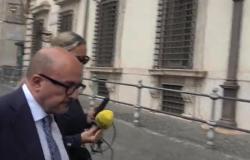The trial on the tragic case of Eluana Englaro is not yet over. To the vast dossier of sentences that have followed one another over the years from the accident in 1992 to the death of the young woman in a vegetative state on 9 February 2009 in the “La Quiete” clinic in Udine after a long hospitalization at the Misericordine nuns’ facility in Lecco, we now add the verdict with which the Court of Auditors asks the then general director of Healthcare in the Lombardy Region Carlo Lucchina to reimburse the treasury for the 175 thousand euros that the Region had to pay to Beppino Englaro, Eluana’s father, as reimbursement for the damages suffered and the expenses incurred for not being able to “terminate” her daughter in a Lombard healthcare facility.
The sequence of events is known, and still painful. The decisive ruling of the Supreme Court which in 2007 authorized the interruption of care including life support treatments, such as nutrition and hydration, was followed the following year by the green light from the Court of Appeal to the detachment of basic supports.
But the Lombardy Region, by order of Lucchina, had opposed the fact that a seriously disabled person could be killed in Lombardy, recalling that health workers who had done so would have “failed to fulfill their professional obligations”. A formal act that forced Beppino Englaro to look outside the region for a structure available to suspend life support (Eluana needed nothing else to live other than to be nourished and hydrated, like millions of non-self-sufficient people). Hence the economic tug of war, with a first sentence of acquittal and a second of conviction, which now presents the very high bill to Lucchina. And to a whole vision of a paradigmatic case of the way we see life, care and death.
Beyond the merit, it is the motivations of the accounting magistrates that give us food for thought: in fact, Lucchina would have been led by a «personal and ethical conception of the right to health»«the fruit of a personal and authoritative interpretation of the right to life and health».
Words that on the left evoke the need for a law on euthanasia: «After a long time it is scandalous that Italy does not have a law on the end of life», says Luana Zanella, group leader in the Chamber of the Greens and Left Alliance, who however forget law 217 of 2019 on advance treatment provisions, which implemented what happened to Eluana and, in 2017, to DJ Fabo.
The deputy group leader of Fdi in Montecitorio, Augusta Montaruli, speaks instead of an “alarming signal” and a “dangerous trend that discourages the treatment of seriously ill patients”. From Palazzo Lombardia, Matteo Forte, president of the II Institutional Affairs and Local Authorities Commission of the Lombardy Regional Council, reacts indignantly: «It is surprising that the legal issues of substance that led to that legitimate choice of the Lombardy Region were not addressed, but instead it was understood judge the personal conscience” of “one of the best managers the regional health system has ever had, who then as always did not act out of personal convictions, but based on the opinion of the regional attorney’s office”. Forte recalls the «unprecedented situation», with the Court of Cassation having appealed «to the controversial posthumous reconstruction of the woman’s will on the basis of the lifestyle prior to the condition of disability in which she found herself, and in the total absence of a specific reference legislation”. Biolaw experts are no less puzzled.
Domenico Menorello, jurist, member of the National Committee for Bioethics and coordinator of the network of associations “Say it on the roofs” for the dignity of life, is struck by the paradox: «Lucchina, acquitted in the first instance, is now condemned for having applied the legislation (laws and statutes) which orients the National Health Service towards personal care at a time when the law on the end of life had not even been approved and the Constitutional Court had not yet ruled on the limited non-punishability of assisting suicide. What is even more serious is the consideration for which he would have acted as a Catholic”, the “personal conception” evoked by the sentence.
«I hope – concludes Menorello –, beyond the different opinions, the entire Catholic world as well as the entire authentically liberal world rejects this prejudice, which exposes every believer to a public suspicion of discrimination, according to which Catholics are led to act according to a implicit conscience different from the laws of the State”. Giovanna Razzano, a constitutional expert from Sapienza, also a member of the Cnb, speaks of a “paradoxical condemnation”: “The Supreme Court authorized the guardian and not a doctor or a healthcare facility to detach the tube. How can we blame and even condemn for treasury damage those who, in this tangled affair, have adopted the precautionary principle, especially the in dubio pro vita principle, which has always accompanied human, ethical and legal experience?”. The conclusion intervenes on the hypothesis of a new law: «According to the Constitution, the State’s duty to protect the life of every individual derives from the right to life, the first of the inviolable rights of man: not that – diametrically opposed – of recognizing the individual the possibility of obtaining assistance in dying from the State or third parties”.
The intervention
Gambino: this transforms the right to treatment into the right to interrupt one’s existence
«The sentence to compensation is theepilogue of a judicial case that transformed a right to treatment into a right to interrupt one’s existence with the support of the Health Service, distorting its mission». The opinion of Alberto Gambino, national president of the Science & Life Study Center (a few days ago heir to the Association, which fought so hard to save Eluana Englaro) on the sentence that condemned Carlo Lucchina in the Englaro case is clear. Professor of Private Law at the European University of Rome and member of the National Committee for Bioethics, Gambino invites us to consider the possible effects of the ruling of the Court of Auditors, which has also been heard in the first statements of exponents of the political front that supports the legalization of assisted suicide has been in place for some time: «We would not want – states Gambino – for this fallacious trend to be the prelude to a season of clear efficiency-driven origin which, in the name of the simulacrum of self-determination, hides intentions of healthcare choices aimed at saving also with respect to more fragile and vulnerable patients and, ultimately, more “expensive”.
However, this is not the perspective of the Constitutional Court which, although recently opening up to assisted suicide, has ruled that there is no obligation for doctors and, therefore, for the Health Service, to support the patient’s suicidal choice”. Precisely on the matter of end-of-life choices, the Council is called upon to give its opinion within a few days: on 19 June the judges will have to examine the question of constitutionality raised by the investigating judge of Florence in the proceedings which involve some radical exponents being investigated, including Marco Cappato, who in 2022 reported themselves for having accompanied a 44-year-old multiple sclerosis patient who was not dependent on life support treatments and who therefore did not fall within the criteria set by the Court in the Fabo-Cappato case for medically assisted suicide to die in Switzerland.
An extensive application of the limits established with the previous sentence would introduce that “right to die” which the Council has so far excluded and for which the supporters of Eluana’s induced death fought. An intertwining that is now illuminated by the ruling of the Court of Auditors: «We trust that even administrative justice – concludes Gambino –, opaque in the Englaro case, will comply with the full constitutional dictate of the solidarity and non-destructive mission of Italian healthcare».






